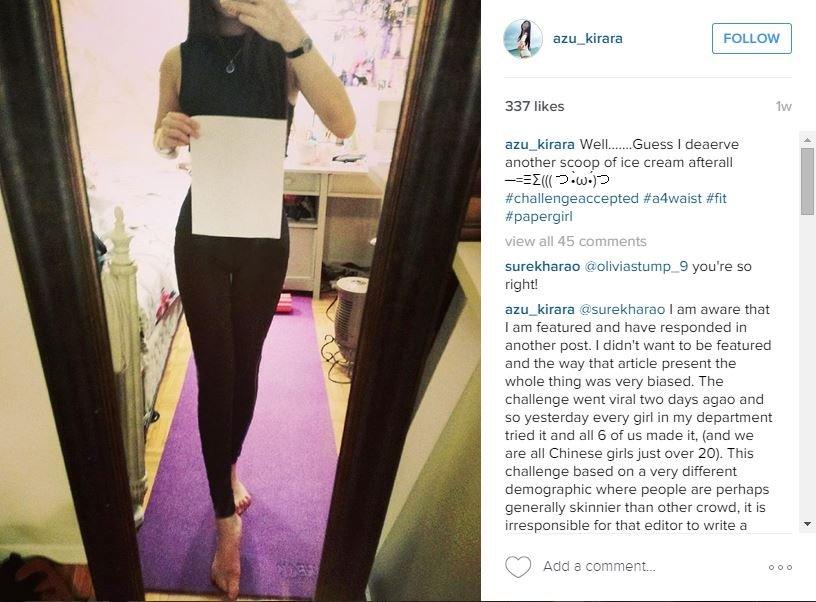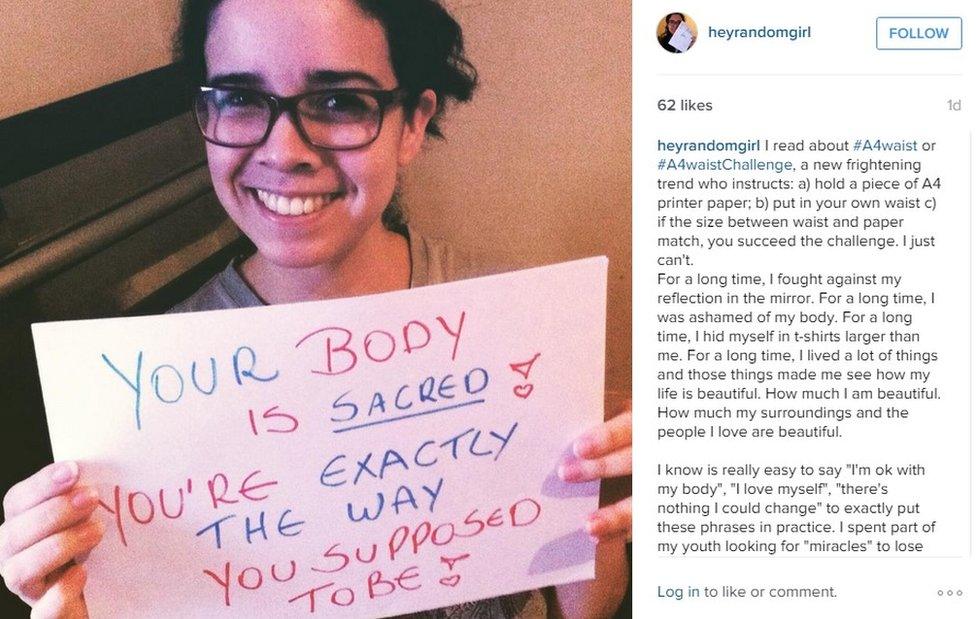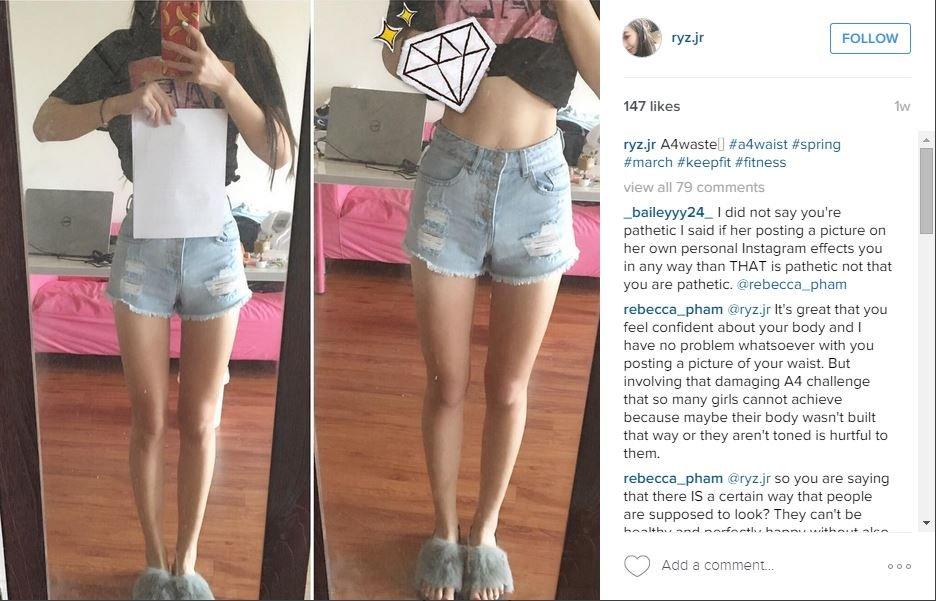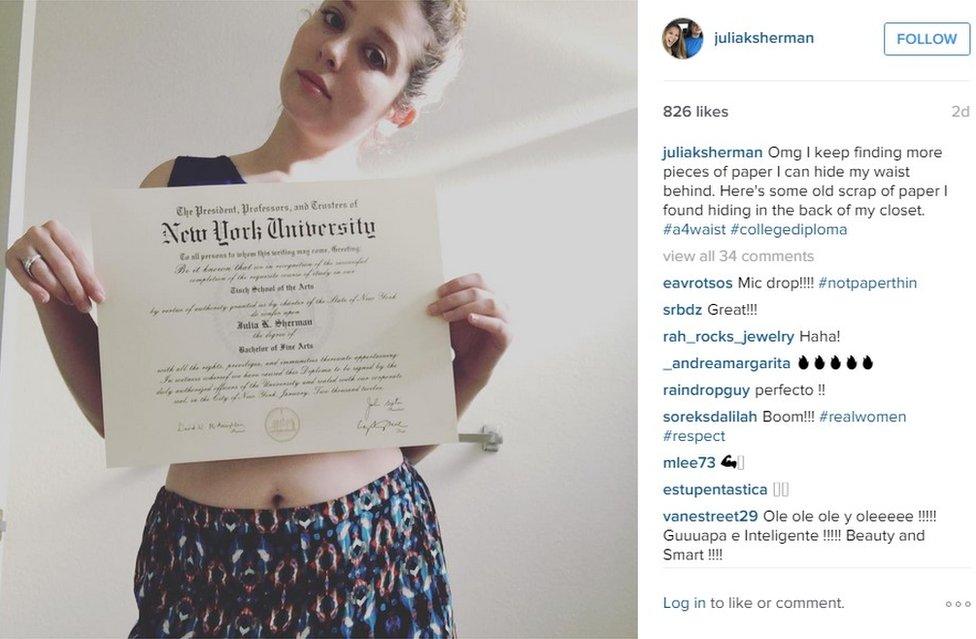Why would anyone take the A4 skinny waist challenge?
- Published

Azura Ge said she participated in the A4 challenge to show off her fitness regime
The #A4waist challenge - in which women compare the size of their waists to the width of a standard A4 sheet of paper - started in China and prompted a huge online backlash. But what do some of the women who participated in the trend say - why did they take part?
It's been criticised as irresponsible and potentially unhealthy. The latest craze from China involves mostly women holding up sheets of paper and taking selfies - they "win" if the paper entirely obscures their waist. It's called the "A4 challenge" after the standard paper size that's just 21cm (8.3in) across.
Critics - and there were many online - say the challenge, like other similar trends before it, could promote eating disorders and body shaming:

So why would a healthy person take part?
Azura Ge is a Chinese student in Boston. She told BBC Trending that she was proud to show off the progress she had made in her fitness sessions.
"A lot of people had a weird assumption that I have anorexia, which I don't have," she says. "That's very interesting for me to think that people actually believe you have to have anorexia to be this skinny."

Follow BBC Trending on Facebook
Join the conversation on this and other stories here, external.

After the media coverage of the #A4waist challenge, Ge started to receive negative comments on her Instagram feed. Some people were saying she should take the photo down or that she was underweight. But she objects to the idea that people posting these images are setting a bad example for others, and argues that Chinese people are in general predisposed to being thinner than average, and that ideas of the ideal body shape vary from culture to culture.
"Growing up, I think this is normal, I think this is what people are supposed to be like," she says. "My mum is 50 years of age and she's a mother of two. She probably won't fit into that piece of paper, but she's exactly the same weight as me.
"The nature of our diet is very different. We don't eat as much pizza or fast food. I don't see the harm in it."
Another Chinese student told BBC Trending that she posted a challenge picture in order to show off her recent weight loss. Yuzhu Ruan is a 20-year-old Chinese student in Canada and her Instagram post also attracted some negative comments:

"Some people may think this isn't healthy, but I think it is," Ruan says. "I eat vegetables like broccoli or spinach and I have some fish and beef. I don't think eating French fries or fried chicken is healthy."
But others took issue with the challenge. Angela Hui is a freelance writer in London. She was born in Wales to Chinese parents and she talked to BBC Trending radio about the pressures she faced to be thin growing up in an Asian family.

BBC Trending Radio
More on this story from the BBC World Service here.

"I was brought up with tough love. Asian families just aren't afraid to tell you what they're thinking. You have that fear of being ridiculed and you grow up with a really skewed body image," she says.
"Especially at Chinese New Year, when a lot of families get together, before they say anything they judge you, they're poking you saying 'you've put on weight' or 'you need to eat less.' I'm not confident, I've jumped on many bandwagons for a quick-fix diets. That's not healthy."
And Hui was certainly not a lone voice online, as many posted images mocking or criticising the challenge:


Weibo has spawned a number of challenges linked to body mass, including the "belly button challenge" - which saw people trying to reach around their back to touch their belly button - and the "collarbone challenge", which saw women compete to balance rows of coins on their collarbones.
Blog by Emma Wilson
Additional reporting by Kerry Allen, BBC Monitoring
Next story: Do terror attacks in the Western world get more attention than others?

Do some terror attacks get more attention online and from the news media simply because they happen in the Western world? READ MORE
You can follow BBC Trending on Twitter @BBCtrending, external, and find us on Facebook, external. All our stories are at bbc.com/trending.